How is asparagus beneficial for a woman’s body and how to use it correctly
Asparagus is one of the most delicious and healthy vegetable crops. The benefits of this plant are due to its unique composition. There are more than 200 types of asparagus, but only a few of them are in demand for cultivation.
Asparagus - what it is, what it is used for
Asparagus (asparagus) – it is a perennial of the Asparagus family, a close relative of crops such as garlic and onions. The plant is characterized by long, dense and succulent shoots with needle-shaped cladodes instead of leaves. Thanks to its composition, enriched with many vitamins and beneficial elements, asparagus has found wide use in medicine and cooking.
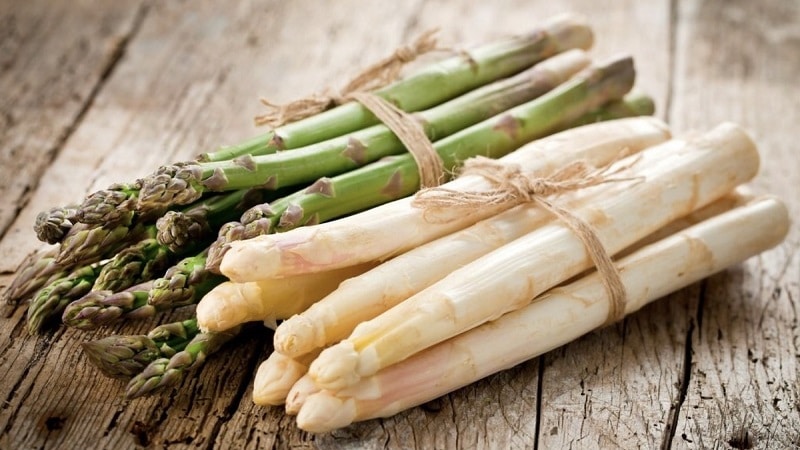
There are several varieties of this culture:
- Green - the most common and most useful type, allowing you to harvest throughout the year. Grows actively on sea coasts.
- Soy – has no direct relation to asparagus as a lek. It is obtained as a result of heat treatment of soybeans. It has an unusual taste and aroma and is often used in diets.
- White – ripens between March and June. Growing this species is accompanied by difficulties, which makes the process quite labor-intensive.
- Purple – a rare species with a characteristic bitter taste, capable of changing color under the influence of temperature.
- Marine – has an external resemblance to algae, lives on salt marshes and sea coasts.It has a salty taste, slightly reminiscent of iodine. The product can be consumed both raw and processed.
- Bean (green beans) – enriched with easily digestible proteins, widely used in cooking, often included in diet menus.
Important! Young shoots are considered the most valuable asparagus, after they are compacted and leaf buds bloom, the crop becomes unsuitable for consumption.
Composition and properties
100 g of asparagus contains the following vitamins, micro- and macroelements:
- provitamin A (518 mcg) – stimulates metabolic processes, maintains the normal condition of the organs of vision and skin;
- B1 (0.1 mg) – promotes full growth and development, and also has a positive effect on the functioning of the nervous and digestive systems;
- B2 (0.1 mg) – normalizes the functions of the thyroid gland, improves the condition of hair and skin;
- B9 (48 mcg) – produces the hormone of happiness (dopamine);
- K (45 mcg) – is responsible for blood clotting and bone metabolism, strengthens the cardiovascular system;
- C (10-20 mg) – suppresses free radicals, promotes the absorption of iron, creates protection against the negative effects of carcinogens;
- E (1.9-2.2 mg) – inhibits the aging process, increases reproductive functions;
- potassium (195 mg) – maintains normal blood pressure, is responsible for heart function and electrolyte balance;
- phosphorus (62.1 mg) – regulates the functioning of the brain, heart, kidneys and liver, stimulates energy production, maintains hormone levels;
- calcium (21 mg) – ensures proper development of the skeleton, regulates the functions of the nervous and circulatory systems;
- sulfur (47 mg) – normalizes protein metabolism, removes toxins from the body;
- iron (0.5-1 mg) – promotes energy production, stimulates oxygen transfer by red blood cells;
- copper (165 mcg) – has an anti-inflammatory effect, ensures elasticity of connective tissue, as well as ligaments, vascular walls and cartilage;
- zinc (336 mcg) – strengthens the immune system, is responsible for the health of bones and reproductive organs.
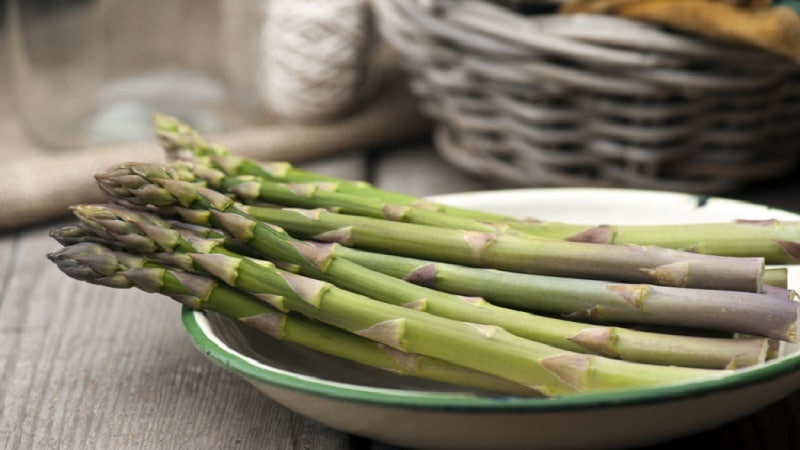
The plant contains flavonoids, terpenes and glycosides.
Important! Asparagus rhizome contains a large amount of saponins, which are effective in eliminating inflammatory processes in the urinary system.
Calorie content and BZHU
Nutritional value per 100 g of product:
- calorie content – 20 kcal;
- proteins – 2.2 g;
- fats – 0.1 g;
- carbohydrates – 3.9 g;
- water – 93 g;
- dietary fiber – 2.1 g.
What are the benefits of asparagus for a woman’s body?
Regular consumption of asparagus helps saturating the body with vitamins and beneficial micro- and macroelements and strengthening the immune system. The product improves the functioning of the endocrine system, thus regulating hormonal levels. It also removes accumulated salts from the body, normalizing the water-salt balance.
During pregnancy
Asparagus contains almost all the vitamins and nutrients necessary for normal fetal development.. In addition, their complex supports the beauty and health of a pregnant woman. Of great importance is the presence of folic acid in the culture, which takes an active part in the formation of the baby’s nervous system. Its deficiency leads to the development of various pathologies in the child and anemia in the mother.
Vitamins and minerals help restore the imbalance of substances in the mother's body, spending its own reserves on the formation of the fetus.The complex of vitamins A, C, E maintains healthy nails, hair and skin, which is extremely important for a pregnant woman. The laxative and diuretic effect of the culture prevents constipation and swelling.
During lactation
The postpartum period is characterized by weakened immunity due to a deficiency of nutrients in the body. Including asparagus dishes in your daily diet helps you regain strength and get back to normal in a short time.. Due to the low calorie content, a woman can easily regain her previous weight without limiting herself in the carbohydrates and proteins necessary for energy production. The product normalizes hormonal levels and prevents the development of postpartum depression.
In progress breastfeeding the newborn also receives all the useful elements.
Important! Before consuming asparagus during breastfeeding, it is recommended to consult a doctor due to the content of sulfur compounds in the product, which cause flatulence in the baby and change the taste of mother's milk.
When eating asparagus, nursing women adhere to the following rules:
- gradual introduction of the product into the diet due to the possible development of an allergic reaction in the child;
- use only fresh shoots that have undergone heat treatment, since in canned form the product can cause harm to the baby’s digestive system.
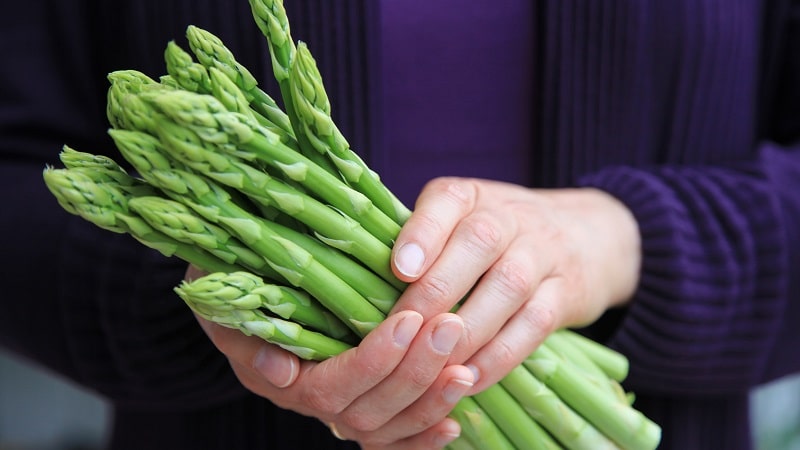
Applications of asparagus
Asparagus shoots are popular among gourmets: There are many recipes for preparing delicious and healthy dishes from this culture. In addition, the plant has found wide application in cosmetology, official and folk medicine.
In cooking
In cooking, asparagus is baked, boiled, stewed, frozen and preserve. Young shoots are used to make tasty and healthy salads, soups, side dishes, desserts and even drinks.
In folk medicine
Asparagus rhizomes and shoots are used in folk medicine. For this purpose, the vegetable crop is harvested in the fall and dried in the fresh air. Dishes prepared from it are used for diet and various diseases, namely:
- For pancreatitis – to stimulate the production of gastric juice, speed up the digestive process and protect the gastric mucosa. Consumption of shoots helps eliminate all toxins accumulated in the body.
- For gout – to remove deposits of urea and metals formed in cartilage and bone tissues. The green type of asparagus breaks down oxalic acid compounds, stimulates metabolic processes, thereby eliminating pain.
- For diabetes – to regulate blood glucose levels, stimulate insulin production and remove cholesterol from the body.
Based on asparagus roots prepare medicinal decoctionstaken for the following problems:
- pyelonephritis;
- urolithiasis disease;
- cystitis;
- hysteria and neuroses;
- prostate adenoma.
An infusion prepared from asparagus fruits is used to treat impotence, dysentery and diarrhea.
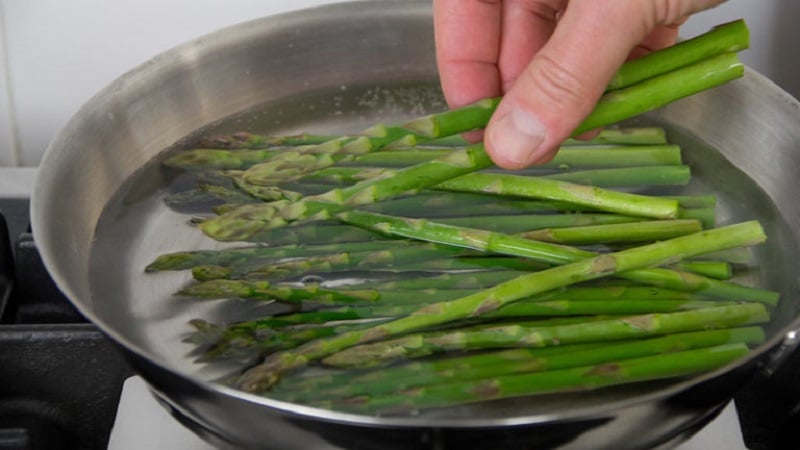
In cosmetology
For cosmetic procedures at home, use the pulp of the shoots, infusion, decoction or juice of the plant. Such products have a number of beneficial effects, maintaining youth and health of the skin:
- rejuvenation of facial skin, tightening its contours;
- elimination of inflammation and acne;
- getting rid of excessive secretion of subcutaneous sebum;
- nutrition;
- lifting effect;
- hydration;
- bleaching.
For weight loss
The vegetable, enriched with protein and fiber, is also a low-calorie product.. This allows you to use it when losing weight. The product satisfies the feeling of hunger and provides the body with the necessary energy, without contributing to the gain of extra pounds.
Asparagus dietary fiber improves gastric secretion, stimulates digestive processes and removes undigested food residues. The shoots, rich in vitamins and minerals, promote the breakdown and absorption of carbohydrates, fats and proteins. Thanks to the diuretic effect of the culture, excess salts and liquid are removed from the body, causing the amount of fat deposits.
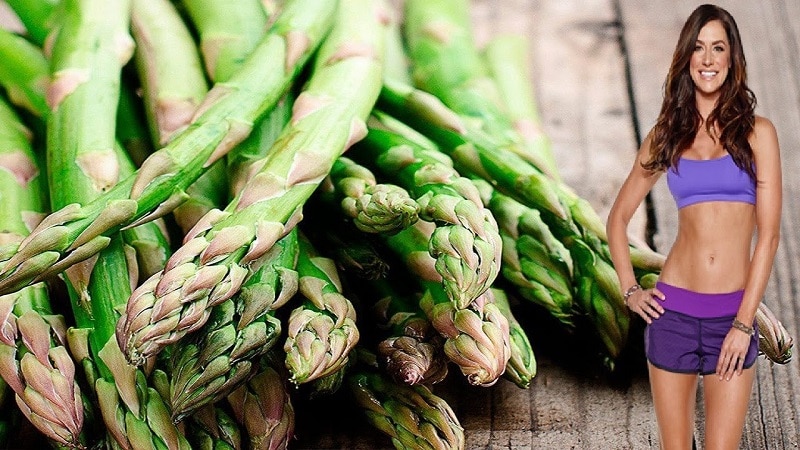
Contraindications
Despite the many useful properties, asparagus has contraindications. The use of shoots is undesirable in the presence of prostatitis and cystitis. The product is used with great caution in acute forms of the following diseases:
- pancreatitis;
- allergic reaction to garlic and onions;
- ulcer;
- gastritis;
- cholecystitis.
Possible harm
In some cases, asparagus causes harm to the body. For example, her Excessive consumption leads to flatulence, and the sulfur contained changes the odor of the body and urine.
Conclusion
Asparagus is a healthy product, enriched with minerals and vitamins that support the beauty and health of a woman. However, to avoid problems, you should consult a specialist before consuming it regularly.